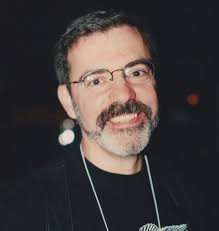Scholars Praise Allan Bérubé, Gay Pioneer
Path-breaking Researcher on Gays in the Military is dead at 61
SANTA BARBARA, CA, – Allan Bérubé, who died Tuesday from complications related to stomach ulcers, stumbled onto the “secret world of gay soldiers” in 1979. But he left their world irrevocably changed, as he did the larger universe of gay and community activism which his scholarly spirit indelibly touched. This week, historians and other colleagues and friends of Bérubé, who was 61, remembered not only his pioneering work on gay culture, but his passionate dedication to the many communities and causes he joined since first coming to progressive politics as an opponent of the Vietnam War.
Bérubé’s 1990 book, Coming Out Under Fire: The History of Gay Men and Women in World War Two recounted the personal experiences of the previously invisible gay GIs from that war, and also brought to light the formative influence of military life on both gay culture and the wider American society. It showed how the medical profession joined forces with the military to establish an image of homosexuals as mentally ill non-conformists who were a threat to the military and to society.
The project was born when a neighbor in San Francisco’s Haight-Ashbury district handed him a stack of hundreds of letters written by gay GIs that his friend had discovered in a dumpster. “Reading those letters,” wrote Bérubé ten years later, “changed my life. It made me want to know more about both lesbian and gay GIs in World War II, so I set out to uncover and make public their hidden stories.”
Bérubé was active in the gay liberation movement starting in the late 1960s and inhabited several experimental worlds of queer and artistic collective living. In 1978, he helped found the San Francisco Lesbian and Gay History Project. He took a slide show on the road that depicted women living as men, and soon after, began to research the history of gays in the military.
The successful result was Coming Out Under Fire, which, together with Randy Shilts’ 1993 book, Conduct Unbecoming, became the twin foundational pillars of scholarship on the quiet struggles of gays and lesbians to serve their country with honor. The book won a Lambda Literary Award and helped raise Bérubé’s visibility as a scholar. In 1996, he earned a MacArthur Foundation “genius” grant and then received a Rockefeller Residency Fellowship in the Humanities from the Center for Lesbian and Gay Studies at CUNY. There, he was working on research about gay union men in the 1930s and 1940s. He traveled widely to present his work, and published in many magazines, newspapers and academic volumes, including Mother Jones, The Advocate and Gay Community News.
The book, which was cited on the Congressional floor during the dramatic 1993 hearings on the military’s gay ban, was adapted into a documentary in 1994 by Arthur Dong. Based on newsreels, military film footage, photos and interviews, the film, which won a Peabody Award, followed nine gay and lesbian veterans of World War II. Today, Dong recalled his close collaboration with Bérubé on the film. “Allan’s patience and sly humor were almost angelic,” he said, “along with his knowing smile whenever our production team finally ‘got’ yet another intricate point he was trying to make. I hear his chuckles now and can only be sure that he’s so gratified to be forever a part of the history that he so passionately documented.”
Aaron Belkin, director of the Palm Center at University of California, Santa Barbara, which studies gays in the military, said the book was instrumental in launching scholarly investigations of gay and lesbian military service. He recalled Bérubé’s commitment to careful research in the challenging context of independent scholarship. “Bérubé’s brave and deeply respectful scholarship stands out among the most meticulously researched, thoughtfully argued and eloquently expressed in the field,” said Belkin. “He wrote his first book without any university sponsorship or financial support, taking day jobs to pay the bills.”
John D’Emilio, professor of history at the University of Illinois at Chicago, and another early champion and practitioner of gay studies when such topics were still marginalized, remembered Bérubé’s “great pride in his role as a community historian,” who beamed at having written a book that “made a difference in the world” despite being authored by a college dropout.
Bérubé spent his last years living in Liberty, NY, a slowly re-emerging Catskills resort town of 4,000, where he operated a bed and breakfast and an antiques store, and served as trustee and community-development coordinator of the village. The inn, “Carrier House,” gave discounts to writers, and Bérubé frequently sent his guests on a stroll through his twelve-acre “Carrier Grove” nearby, where they would find peace and inspiration in woods, orchards and a stream running through it.
Lisa Duggan, professor of Social and Cultural Analysis at New York University and an author of several books on sexuality and queer culture, knew Bérubé for three decades, and described him as the “heart and soul of the early lesbian and gay community history movement.” She said news of his death came as a “terrible shock and loss” and that his “truly democratic mode of intellectual activism” would be deeply missed.
Bérubé is survived by his partner, John Nelson, his mother and three sisters.
The Palm Center will co-sponsor a forum this spring at CUNY’s Center for Lesbian and Gay Studies in New York City in honor of Allan Bérubé.
